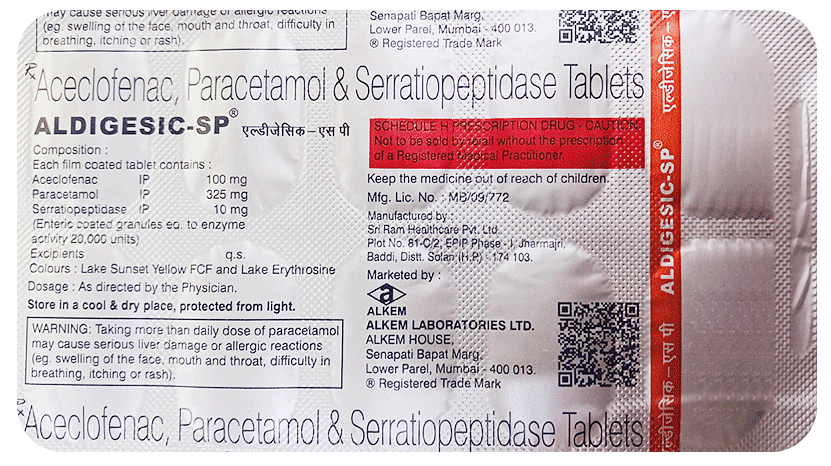
Hidepain SP 100mg/325mg/10mg Tablet
Manufacturer
Hydnora Medicare Pvt Ltd
Salt Composition
Aceclofenac (100mg) + Paracetamol (325mg) + Serratiopeptidase (10mg)
Key Information
Short Description
Hidepain SP 100mg/325mg/10mg Tablet is a combination medicine used to relieve pain and swelling in various conditions like muscle pain, joint pain, and postoperative pain.
Dosage Form
Tablet
Introduction
Hidepain SP 100mg/325mg/10mg Tablet is a combination medicine used to relieve pain and swelling in various conditions like muscle pain, joint pain, and postoperative pain. It effectively alleviates pain and inflammation in conditions like rheumatoid arthritis, ankylosing spondylitis, and osteoarthritis.
Directions for Use
Take it with food to avoid getting an upset stomach.Take it in the dose and duration as advised by your doctor. Swallow it as a whole. Do not chew, crush or break it
How it works
Hidepain SP 100mg/325mg/10mg Tablet is a combination of three medicines: Aceclofenac, Paracetamol and Serratiopeptidase.Aceclofenac is a non-steroidal anti-inflammatory drug (NSAID) and Paracetamol is an antipyretic (fever reducer). They work by blocking the release of certain chemical messengers in the brain that cause pain and fever. Serratiopeptidase is an enzyme which works by breaking down abnormal proteins at the site of inflammation and promotes healing
Quick Tips
Take it with food to avoid getting an upset stomach It may cause dizziness and sleepiness. Do not drive or do anything that requires mental focus until you know how Hidepain SP 100mg/325mg/10mg Tablet affects you Avoid consuming alcohol when taking Hidepain SP 100mg/325mg/10mg Tablet as it may cause excessive drowsiness and increase the risk of liver damage Do not take it with any other medicine containing acetaminophen (drugs for pain/fever or cough-and-cold) without asking your doctor first
Related Medicines

Aldigesic SP Tablet

Triofen 100mg/325mg/10mg Tablet

Piolex AS 100mg/325mg/10mg Tablet

Olminac-SP Tablet

Accotek PS 100mg/325mg/10mg Tablet

Aarfen SP 100mg/325mg/10mg Tablet

Shrirest SP 100mg/325mg/10mg Tablet

Acenol Plus 100mg/325mg/10mg Tablet

Dolomas SP 100mg/325mg/10mg Tablet

Norace SP 100mg/325mg/10mg Tablet
Frequently asked questions
What is Hidepain SP 100mg/325mg/10mg Tablet?
Hidepain SP 100mg/325mg/10mg Tablet contains aceclofenac, paracetamol, and serratiopeptidase. These ingredients work together to relieve pain and inflammation.
Is Hidepain SP 100mg/325mg/10mg Tablet safe to take?
Hidepain SP is generally safe for most patients, but may cause unwanted side effects like nausea, vomiting, stomach pain, heartburn, and diarrhea. If you experience persistent problems, consult your doctor immediately.
Can I stop taking Hidepain SP 100mg/325mg/10mg Tablet once my pain is relieved?
This medication can be discontinued when your pain is relieved. However, continue as prescribed by your doctor if they have advised you to do so.
Can Hidepain SP 100mg/325mg/10mg Tablet cause nausea and vomiting?
Yes, the use of this medication can cause nausea and vomiting. If experiencing nausea, take it with milk, food, or antacids. Avoid fatty or fried foods when taking this medicine. In case of vomiting, drink plenty of water or other fluids in small, frequent sips. Consult your doctor if vomiting persists and notice signs of dehydration like dark urine and reduced urination frequency.
Can Hidepain SP 100mg/325mg/10mg Tablet cause dizziness?
Yes, this medication can cause dizziness in some patients. Resting until you feel better is recommended if experiencing dizziness.
Are there any specific contraindications for taking Hidepain SP 100mg/325mg/10mg Tablet?
Avoid using this medication in patients with known allergies to any of its components or excipients, or those with known allergies to other painkillers (NSAIDs). It should be avoided in patients with a history of stomach ulcers or active, recurrent stomach ulcer/bleeding. It's also recommended for avoidance in individuals with a history of heart failure, high blood pressure, and kidney or liver disease.
Can I take Hidepain SP 100mg/325mg/10mg Tablet with vitamin B-complex?
Yes, this medication can be taken alongside vitamin B-complex preparations. It helps relieve pain while correcting any potential vitamin deficiency.
Can Hidepain SP 100mg/325mg/10mg Tablet cause kidney damage?
Yes, long-term use of this medication can potentially lead to kidney damage. The normal function of kidneys relies on prostaglandins; these are chemical substances that protect the kidneys from damage. Painkillers reduce prostaglandin levels in the body and increase the risk of kidney damage over time.
Can I take a higher dose of Hidepain SP 100mg/325mg/10mg Tablet than recommended?
No, exceeding the recommended dose can lead to increased chances of side effects. Consult your doctor if experiencing increased pain severity and see if they need to adjust the dosage.
What are the instructions for storing and disposing of Hidepain SP 100mg/325mg/10mg Tablet?
Keep this medication in its original packaging, tightly sealed. Store it according to the directions on the label. Do not use after expiry date or discard unused medication safely as per instructions.


